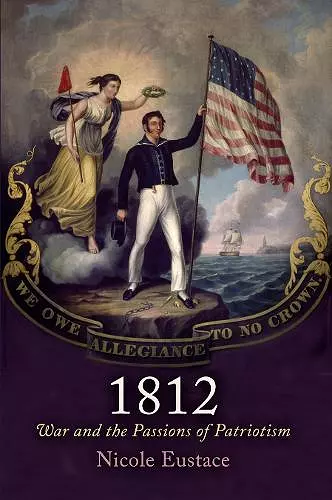1812
War and the Passions of Patriotism
Format:Paperback
Publisher:University of Pennsylvania Press
Published:30th Jul '15
Currently unavailable, and unfortunately no date known when it will be back

This cultural history reveals how the War of 1812, despite its failures, captivated American sentiment through emotional appeals and cultural narratives, as detailed in 1812.
In 1812, Nicole Eustace explores the cultural history surrounding the War of 1812, a conflict often viewed as costly and unproductive. Despite its military failures, the war garnered significant popular support, largely due to emotional appeals that resonated with the American public. Eustace delves into how pivotal events during the war became symbols of opportunity and adventure, capturing the imagination of a young nation eager for identity and purpose.
The narrative examines key occurrences, from the initial failed invasion of Canada to the notable Battle of Lake Erie, where Oliver Perry's famous flag bore the message 'Don't Give Up the Ship.' The war's impact was profound, as it led to the burning of Washington, D.C., and a tripling of the national debt. Yet, the emotional fervor surrounding these events helped cultivate a sense of national unity, known as the 'era of good feelings,' despite the war's tangible losses.
Eustace highlights how various cultural expressions, such as presidential speeches, political cartoons, and popular songs, romanticized the war and framed it as a noble endeavor. This portrayal allowed the general populace to engage with the conflict emotionally while remaining largely insulated from its harsh realities. Ultimately, 1812 reveals the lasting significance of this tumultuous period, laying the groundwork for a brand of patriotism that continues to influence American identity today.
"Insisting that the pen is mightier than the sword, Eustace presents the War of 1812 more as a cultural event than a military one and examines the nation that emerged from the war, re-formed by aggressive Republican party rhetoric. . . . A powerful analysis of the political rhetoric the war generated." (Carroll Smith Rosenberg, Journal of American History) "This is far and away the most important book written on the War of 1812 in several decades." (David Waldstreicher, Temple University) "Probably no book published on the occasion of the bicentenary of the War of 1812 offers so many new insights into the War of 1812 as Eustace's. The role of gender and race in popular representations of the war but also their relation to the burgeoning American nationalism in the war years had hitherto yet to be addressed in such a compelling manner." (Reviews in History) "With this second book, Nicole Eustace establishes herself as one of the premier cultural historians of the early American republic. Eustace paints the War of 1812 as a moral as well as emotional conflict. She shows how the war's supporters pushed the idea that all Americans could contribute to the nation by expanding the population, and that love, marriage and propagation were key forms of American liberty as well as expressions of patriotism. Women and even African-Americans could be enlisted in parts of this project. The only people left out completely were the original population of American Indians. In making this argument, Eustace shows the importance of the war to American history on the eve of its bicentennial." (C. Dallett Hemphill, author of Siblings: Brothers and Sisters in American History)
ISBN: 9780812223484
Dimensions: unknown
Weight: unknown
336 pages